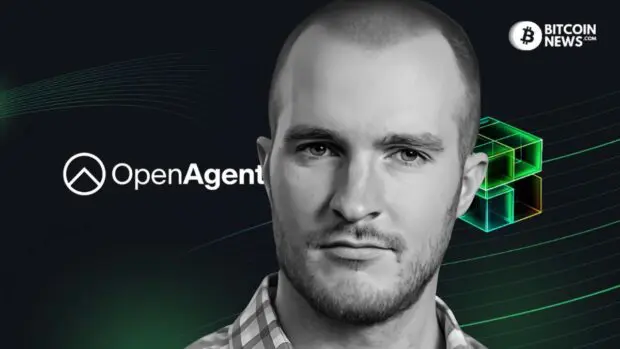GPUtopia, the groundbreaking new marketplace that empowers people to monetize idle GPU capacity and earn Bitcoin in a seamless and effortless manner, rebrands to OpenAgents.
The platform seeks to engage a wider community, including AI contributors and computational power vendors. It aims to provide a cost-effective hub for top-tier AI services, leveraging Bitcoin and the Lightning Network, offering more accessibility compared to pricier competitors like OpenAI.
GPUtopia Rebranded to OpenAgents
OpenAgents harnesses the processing capabilities of your GPU, leveraging WebGPU, a cutting-edge web standard recently introduced in newer versions of Google Chrome. This seamless integration allows you to contribute a portion of your GPU’s power to tasks like AI training and inference, while simultaneously earning Bitcoin rewards.
The process is extremely simple. Download the language model, a 4GB file stored in your browser’s cache, which takes only a few minutes. Upon completion, you’re ready to receive inference jobs, which typically last between 5 and 30 seconds, depending on your GPU’s capabilities and the job’s size.
Upon completing each inference job, your computer automatically sends the results to the OpenAgents server, where you’re rewarded with Bitcoin directly to your Alby wallet. Creating an Alby wallet takes a mere two minutes, enabling you to start earning bitcoin instantaneously.
OpenAgents envisions a collaborative marketplace where individuals can contribute their GPU compute power to various tasks, while buyers, seeking GPU resources for AI training or inference applications, can access this valuable resource seamlessly. This pioneering approach revolutionizes the way we utilize computing power, fostering a thriving ecosystem of empowered individuals and resourceful buyers.
Interview with OpenAgents
On the occasion of the official rebrand of GPUtopia, we had the opportunity to interview Christopher David, founder and CEO of OpenAgents.
– Give us a little overall introduction to your project. What is it about and why did you start it?
Trying to add uncensored AI chat to a mobile app I was building, I hit roadblocks featuring big red error boxes saying “not enough hardware capacity”. That was surprising to see from established funded companies like HuggingFace, which just resells GPU compute from AWS and others.
I thought if even the large players had trouble sourcing compute, that was a challenge worth solving. Where was the open marketplace of compute with an elastic supply that could grow with demand? Two months later we’d built that as GPUtopia, perhaps the largest decentralized compute network using consumer devices with sellers paid in bitcoin.
That is paired with an OpenAI-compatible API that works with open models from HuggingFace, now supporting text inference, embeddings, image generation, and finetuning. We scratched our own itch and solved that for others, but have since discovered a larger opportunity to use with that network: automated agents.
– What prompted the decision to rebrand GPUtopia as OpenAgents?
We don’t know if years from now GPUs will even be used for AI calculations. They could be made obsolete by ASICs as they were for bitcoin mining. What we believe for certain is that every person and company will have multiple automated AI agents working on their behalf: for work, entertainment, education and more.
Who will own those agents? A closed-source megacorp with a history of monopolization and regulatory capture? Or an open cloud built on open models, open data, and open compute? That’s what we are building.
– How does the OpenAgents platform differ from GPUtopia?
We’re folding the idea of crowdsourced compute into OpenAgents so no changes there. And we’re expanding the idea of earning bitcoin micropayments to every other aspect of training, using and promoting AI agents: including the model authors, developers of AI apps, referrers, educators and more. OpenAgents will be the easiest place to build and customize your agents – and earn your share of the productivity they unleash.
– What are the key features of the OpenAgents platform?
You can create and customize your own AI agent with no coding required. List it on the marketplace and earn bitcoin rewards from others who use it. Developers can create agent plugins and earn rewards every time they’re used by others. Community tools allow for easy collaboration to create the best agents, rewarding top contributors with revenue-sharing.
– What are the specific benefits of the OpenAgents platform for sellers of GPU compute, model authors, AI app developers, referrers, and educators?
We aim to pay all those people the most money, the hardest money (bitcoin), the fastest, with the easiest user experience. We take the value-for-value idea to the extreme, paying everyone fair dividends for the AI agent revolution.
– How does OpenAgents plan to incentivize broad-based participation in the AI agent revolution?
The ecosystem needs a community platform like a “HuggingFace for agents” built on open source, open models, open data, open money, and open compute. It should be the easiest place to build and commercialize AI agents, paying everyone involved a fair share of the value they create. And it must be open to all people.
– What are your plans for future development and growth of OpenAgents?
Productizing agents and growing those revenue streams will keep us busy for years. Long term we aim for vertical integration of an open AI stack from agents to hardware. We know that AI agents will be increasingly relevant in robotics – and they may even help design the spacecraft that carry those robots and eventually humans to other worlds. We’ll crowdsource the agents, then maybe crowdsource a space program!
– What are some of the challenges you anticipate facing in the development and adoption of OpenAgents?
Fearful people are now lobbying governments to crack down on open AI. That may increase. Fortunately open networks can move faster than governments. And we must. Any true “safety” will come not from regulation but through openness, interpretability, and honest incentives in a free market.
– How do you see OpenAgents contributing to the future of applied AI?
The open-source AI community is already on the verge of leading the AI revolution, seizing the initiative from the closed-source monopolists. We plan to strengthen that leadership by infusing proper economic incentives like value-for-value throughout the open AI stack. Multiplying innovation across thousands of use cases involving millions of people is hard to visualize – but certainly can only happen through open networks. This is way bigger than any one company. It is about the future of humanity and the next stage of evolution. Truly open AI is required.
– In late November/beginning of December, the US Treasury sent a letter to the Senate Banking and House Financial Services Committees. Included with the letter was a memo titled “Potential Options to Strengthen Counter-Terrorist Financing Authorities,” emphasizing on the need for extended surveillance and powers to sanction open-source software. What’s your take on that?
America is led by corrupt myopic idiots. We must build faster than their system decays.
– Tell us more about your vision for AI-powered wearable devices. How would users’ personal data be secured?
All that code from firmware to software must be open-source. Otherwise the security model is “trust me bro”, which simply won’t work in a future of billions of agents. Everything must be open and inspectable.
– How do you manage to integrate Nostr in the OpenAgents infrastructure?
We’ve awarded one open-source bounty for rebuilding part of our GPUtopia worker software in Nostr. We’ll continue exploring Nostr integration. It remains to be seen if Nostr is the appropriate architecture for communication between AI agents or if it should be supplemented or replaced by some other key-and-metadata architecture like the web5 decentralized web nodes.
It’s too soon to say. More R&D work is needed here and we hope to contribute toward it. Our short-term priority is to ship product users love and iterate toward a fully decentralized open AI substrate gradually over time.
– What are OpenAgents’ main competitors?
Our primary competitor is “OpenAI”, the company of hypocrites that should now be called “ClosedAI”. It became clear from their recent dev day presentation that they view agents as the future of AI. Their ‘GPT store’ idea is weak and half-assed; we’re doing a better version with thorough value-for-value payments and built on open models, open data, open compute and all the rest. They have peaked and we will profit from their decline.
– What are your advantages and disadvantages, compared to industry firsts in class like OpenAI and Google?
Google blew their lead and can’t ship. OpenAI is hamstrung by their complex governance and Microsoft’s puppet strings. Their closed-source, proprietary approach is done. The energy and momentum is with the truly open AI community and that will only accelerate.
Our main two advantages are that we build on the shoulders of open-source giants like Llama and Mistral, and that we extend the Bitcoin consensus – a strategic position that will become increasingly relevant as the ETF floodgates open. The rising tide lifts all boats, except for those anchored to the past.
– OpenAI outsourced a significant portion of this work to Africa at a relatively low price point ($2/hour) for data labeling. This strategy played a crucial role in the development of ChatGPT. Do you intend to replicate OpenAI’s model by establishing a similar infrastructure for data labeling, aiming to enhance the quality of open-source datasets while applying OpenAgents’ market-driven approach and rewarding data labeling efforts using the hardest money ever created?
Yes, we agree with Yann LeCun that human feedback for open LLMs needs to be crowdsourced, Wikipedia style. Perhaps that should be done in a dedicated open platform for that purpose, but until someone else builds it we’ll plan to do it ourselves. Being paid bitcoin micropayments for your data curation efforts dovetails perfectly with our other value-for-value plans.
– How can open-source AI infrastructure companies achieve profitability while maintaining their open-source ethos?
There’s a well-established precedent of commercial open-source software (COSS) companies balancing an ethos of openness with commercial revenue streams. GitLab is one example of a successful public company built around open source. There’s nothing mutually exclusive about making money while being open source. Do you want to capture 100% of the value from a smaller closed-source pie or 50% of a pie that’s 10x bigger because you built a way larger audience committing to openness?
– Do you think investors have realized how bullish the combination of Bitcoin and AI is?
No – or if they have, they haven’t seen a vehicle that lets them make a concentrated bet on that intersection of bitcoin and AI because it hasn’t been clear where value will accrue. The space is so fast-moving and we are still so early.
– How do you plan to attract capital to fund your operations during the next Bitcoin super-cycle?
We’ve already raised enough to operate for a long time. We plan to rapidly expand and may raise additional venture capital but we’re excited first to see how far we can get by prioritizing revenue and funding growth through profits. As bitcoiners we have a long time horizon and low time preference. Our business should reflect that.
– Can a decentralized network of GPU-powered AI products from everyday people match the computing power of centralized, private corporate computing farms like Google or OpenAI?
The short answer is yes for most use cases consumers care about. We don’t need to train foundation models because companies like Meta are doing that for us, releasing the Llama models under open licenses and such. But note that there’s no requirement a crowdsourced GPU network must run only on consumer devices. We’re already talking with institutional bitcoin miners exploring integration of their new GPUs into our network.
We expect to see increasing connection between AI infrastructure and bitcoin mining infrastructure, so the network may become professionalized over time just like early bitcoin mining was. That’s a good thing. This is the infrastructure that will power civilization 2.0. OpenAgents will help ensure those benefits are broadly distributed to anyone who wants to participate.










